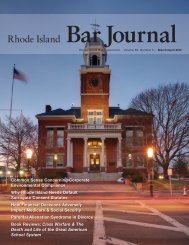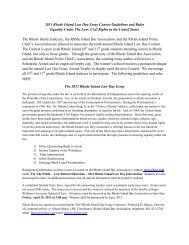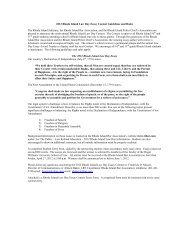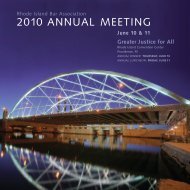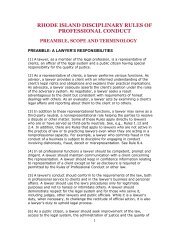Are We Taking The Sex Offender Label Too Far? - Rhode Island Bar ...
Are We Taking The Sex Offender Label Too Far? - Rhode Island Bar ...
Are We Taking The Sex Offender Label Too Far? - Rhode Island Bar ...
You also want an ePaper? Increase the reach of your titles
YUMPU automatically turns print PDFs into web optimized ePapers that Google loves.
silent. At trial, the magistrate ruled “I<br />
don’t think it, [the] [refusal] needs to be<br />
verbal. I think his actions certainly indicated<br />
to this officer that he’s refusing a<br />
test.” 31 <strong>The</strong> Appeals Panel agreed holding<br />
the “silence [w]as a constructive, or conditional<br />
refusal, which we have held to<br />
have the same legal effect of an actual<br />
refusal.” 32<br />
VII. Questioning By Court<br />
In State v. DiPrete, 33 the police stopped<br />
the motorist based on information from<br />
dispatch regarding a possible hit and run<br />
accident. A witness to the accident called<br />
dispatch and relayed information (make,<br />
model, license plate number and location<br />
of the vehicle) to the police, including the<br />
motorist might be intoxicated. <strong>The</strong> officer<br />
never observed the motorist commit<br />
any traffic violations before stopping the<br />
vehicle. <strong>The</strong> motorist was never charged<br />
in connection with the accident, but he<br />
was charged with DUI and Refusal. At<br />
trial, the magistrate asked questions of<br />
the officer including detailed information<br />
he received from dispatch and why the<br />
motorist was stopped. On appeal, the<br />
motorist alleged the Trial Magistrate<br />
violated the Rules of Evidence, and there<br />
was a lack of evidence regarding his<br />
alleged impairment. <strong>The</strong> Appeals Panel<br />
held “that Magistrate Goulart’s questions<br />
clarified previous testimony and is wholly<br />
consistent with Rule 614 and the proposals<br />
enumerated in Nelson.” 34 With regards<br />
to the reasonableness of the stop, the<br />
Appeals Panel looked at the totality of<br />
the circumstances known to the officer at<br />
the time of the stop. <strong>The</strong> Panel determined<br />
the stop was reasonable because the witness<br />
observed the accident and continued<br />
to follow the vehicle while talking to dispatch,<br />
the officer verified/corroborated<br />
aspects of the tip before stopping the<br />
motorist’s vehicle and the informant was<br />
trustworthy by providing a statement to<br />
police. 35<br />
VIII. Confidential Telephone Calls<br />
(R.I. Gen. Laws 12-7-20)<br />
In State v. Quattrucci, 36 Judge<br />
McLoughlin affirmed the decision of the<br />
Appeals Panel which upheld the decision<br />
of Magistrate DiSandro to dismiss the<br />
Refusal charge based on the lack of a<br />
confidential telephone call. When asked<br />
by the Warren Police if he wanted to<br />
make a confidential telephone call, the<br />
motorist responded that he “didn’t care”<br />
and made several phone calls in the presence<br />
of the officer. <strong>The</strong> presence of the<br />
officer violated his rights pursuant to R.I.<br />
Gen. Laws 12-7-20. 37<br />
However since Quattrucci, there<br />
seems to be a shift in the motorist’s right<br />
to a confidential telephone call pursuant<br />
to R.I. Gen. Laws 12-7-20 in the context<br />
of refusal cases as demonstrated in the<br />
following three cases.<br />
In DeCorpo v. State, 38 the Refusal<br />
charge was sustained despite the presence<br />
of the police during the motorist’s telephone<br />
call. On appeal to the 6th Division<br />
District Court, Magistrate Ippolito held<br />
“the right to a confidential telephone call<br />
found in § 12-7-20 does not apply to<br />
those charged with civil violation –<br />
‘Refusal to Submit to a Chemical Test.’” 39<br />
(emphasis added). He reasoned that proof<br />
the defendant was not afforded a confidential<br />
telephone call is not an element of<br />
the Refusal statute (31-27-2.1) that must<br />
be proven by clear and convincing evidence.<br />
40 In addition, 12-7-20 is part of the<br />
criminal procedure/arrest statute which<br />
does not include civil violations. 41 Its purpose<br />
is to provide a phone call to arrange<br />
continued on page 42<br />
SOLACE<br />
SOLACE, an acronym for Support of<br />
Lawyers, All Concern Encouraged, is a<br />
new <strong>Rhode</strong> <strong>Island</strong> <strong>Bar</strong> Association program<br />
allowing <strong>Bar</strong> members to reach out, in a<br />
meaningful and compassionate way, to their<br />
colleagues. SOLACE communications are<br />
through voluntary participation in an email-based network<br />
through which <strong>Bar</strong> members may ask for help, or volunteer to<br />
assist others, with medical or other matters.<br />
Issues addressed through SOLACE may range from a need for<br />
information about, and assistance with, major medical problems,<br />
to recovery from an office fire and from the need for temporary<br />
professional space, to help for an out-of-state family member.<br />
<strong>The</strong> program is quite simple, but the effects are significant.<br />
<strong>Bar</strong> members notify the <strong>Bar</strong> Association when they need help,<br />
or learn of another <strong>Bar</strong> member with a need, or if they have<br />
something to share or donate. Requests for, or offers of, help<br />
Helping<br />
<strong>Bar</strong> Members<br />
in Times<br />
of Need<br />
are screened and then directed through the<br />
SOLACE volunteer email network where<br />
members may then respond. On a related<br />
note, members using SOLACE may<br />
request, and be assured of, anonymity<br />
for any requests for, or offers of, help.<br />
To sign-up for SOLACE, please go to the <strong>Bar</strong>’s website at<br />
www.ribar.com, login to the Members Only section, scroll<br />
down the menu, click on the SOLACE Program Sign-Up, and<br />
follow the prompts. Signing up includes your name and email<br />
address on the <strong>Bar</strong>’s SOLACE network. As our network grows,<br />
there will be increased opportunities to help and be helped by<br />
your colleagues. And, the SOLACE email list also keeps you<br />
informed of what <strong>Rhode</strong> <strong>Island</strong> <strong>Bar</strong> Association members are<br />
doing for each other in times of need. <strong>The</strong>se communications<br />
provide a reminder that if you have a need, help is only an<br />
email away.<br />
<strong>Rhode</strong> <strong>Island</strong> <strong>Bar</strong> Journal November/December 2011 35





